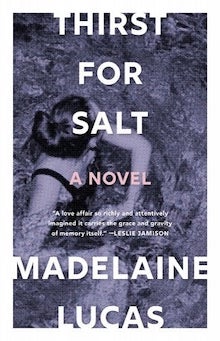
Tin House, 2023
The tale is as old as the ocean itself: a love affair at the beach with a mysterious man seemingly born from the waves. Sea, sand, sex, and struggle too—these are the concerns of Australian writer Madelaine Lucas’s debut novel, Thirst for Salt.
The book opens with an unnamed narrator looking at an online photo of a past lover, a man eighteen years her senior named Jude. More than a decade has passed since the end of their relationship, but her recollection is as crystalline as a tide pool, and memories wash over her for the length of the book.
The narrator first meets Jude while on holiday with her mother at a whaler’s cottage in an Australian coastal town. Twenty-four and only recently out of college, she’s in “a lacuna in [her] still-young life,” living with roommates in Sydney and working at a bookstore café. She’s also struggling to write.
While swimming the narrator notices a man nearby: “Strong arms, browned by sun, emerging out of all that blue.” It’s as if she’s conjured him with her wanting alone. What she wants is “to be held in the way you’re supposed to be when you’re no longer a child.” Who better to do this than an older man who appears from the deep? The narrator’s youth and circumstances create an empty space “that Jude would walk right into.”
There’s something dangerous about Jude. “Sharkbait,” he calls the narrator. “Never turn your back on a shark,” he warns. Yet she does exactly that with Jude, and in turn she is bitten. Infatuated, greedy for Jude’s very marrow, she wants to know everything about him: the women who came before, the details of the life he seemingly hides from her, his dreams at night. Jude, on the other hand, insists that love is freedom. He stays out late without calling, walks several paces ahead of her, keeps her guessing as to the exact elements of his history and family. It helps that he’s older. “It was hard to argue with him when he played the card of time,” she says, “his winning hand, all those years he had over me.”
Their love is desperate, sensual, passionate, and doomed. But her longing has little to do with Jude. The allure of hetero-domestic normalcy captures her as much as Jude’s body and his age. She luxuriates in playing house. She plays Jude’s records, stains his bedsheets with the ink of her pens, and drives him to work in his truck. She feeds backyard birds from the palm of her hand and eats freshly shucked oysters. She even does some writing. “Once, I’d pictured a life of traveling between foreign cities, black turtlenecks and books and eyeliner and cigarettes, disastrous love affairs I would mine later for material in celebrated autobiographical novels,” the narrator tells us, but dreams have never compared to a chaotic and ardent romance. Jude’s cabin becomes their private island. And, like an island, it’s just as claustrophobic as it would be in the middle of the Pacific.
In the hands of a less talented writer, their romance may have been irrevocably pulled into a maelstrom of daddy issues. After all, the narrator comes from a long line of single mothers who’ve been disappointed by men, and the absence of her father as well as her mother’s enduring love for him sets the narrator up to repeat this destiny. But Lucas saves her novel from this fate with deeply beautiful writing and layered thematics. Fans of Marguerite Duras, Joan Didion, Jean Rhys, and Raymond Carver will find some fun literary allusions to explore as well as a weekend’s worth of songs and films that serve as thematic subtext. This is fiction to be savored: Lucas’s style is suited to lingering. If it sometimes lacks narrative propulsion, this lushness wonderfully echoes the heady emotional state of being in love.
By the time the narrator and Jude come to their inevitable conclusion, it’s clear that this story is about more than just a remembered romance. It’s a love affair with small-town Australia, with the ocean, with writing, with nature, friends, the burgeoning self, and, most of all, with family, imperfect as it may be. During her year at the ocean, the narrator awakens into womanhood, coming into her pleasure, creativity, and future as a writer, sister, and daughter.
“As all lovers learn, when love ends, you lose the future as well as the past,” she says. Thirst for Salt delivers future and past in a novel as affecting, steamy, and compelling as the failed love affairs we all occasionally relive in our minds, turning them over until they’re polished smooth as sea glass in the tide. Even though you know it will make you sick, you too will find yourself craving a taste of salt by the end of this lovely book.
+++
Madelaine Lucas is a senior editor of NOON and teaches fiction at Columbia University. She is from Sydney, Australia, and lives in Brooklyn, New York.
+
Carly Willsie is a writer and literary critic at work on her first novel. She lives in New York’s Hudson Valley with her two young sons. You can find her on Instagram @carlywont.